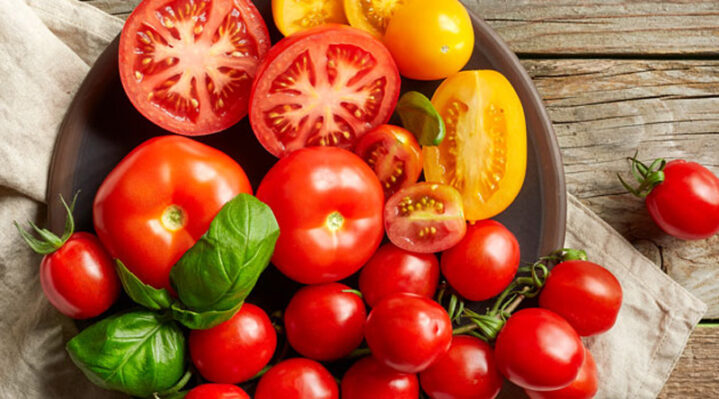
The Health Benefits of Tomatoes
Juicy and sweet, fresh tomatoes are a delicious addition to salads, while the canned variety can be used to make delicious sauces for pasta dishes, stews and curries. But did you know that tomatoes also pack a whole host of health benefits too?
Although often treated as a vegetable in cooking, the tomato is actually a fruit that belongs to the nightshade family, along with aubergines, peppers and potatoes. They come in a range of sizes and varieties from small cherry to big beef, and traditionally they’re red in colour but you can also get tomatoes in yellow, green, purple and orange.
What is the nutritional profile of tomatoes?
Tomatoes are mainly a carbohydrate with some fibre, but they are best known for their vitamin and mineral content which includes calcium, magnesium, beta-carotene (which becomes vitamin A when consumed), vitamins C and E, some B vitamins and vitamin K.
Are tomatoes good for heart health?
A hundred grams of tomatoes would provide about 6% of the recommended daily allowance (RDA) of potassium for adults. There is evidence that higher dietary potassium intake is associated with lower rates of stroke and may be associated with lower rates of heart disease.
Tomatoes also contain a compound called lycopene, which also gives them their red colour, and there is growing research into its properties and potential for reducing ‘bad’ cholesterol (LDL) and reducing the risk of cardiovascular disease.
Are tomatoes good for your eyes?
Tomatoes contain a group of phytochemicals called carotenoids, including lycopene, lutein and beta-carotene. These compounds are important to maintain eye health and may protect against age-related macular degeneration and other eye diseases.
Are tomatoes good for your skin?
The carotenoids found in plants, including tomatoes, may help prevent UV damage in humans. A 2006 study found that after a 10-12 week study there did appear to be a decrease in sensitivity as a result of increasing dietary carotenoids. However, this is not to say that you won’t burn if you eat lots of tomatoes – it’s still important to follow guidelines and be careful in the sun to avoid UV damage. Read the NHS’s sun safety tips for more information.
Can tomatoes help with blood clotting and wound healing?
Tomatoes are a good source of vitamin K which is necessary for blood clotting and wound healing, with 100g of tomatoes containing 6 mcg of vitamin K. There is also increasing evidence that vitamin K may be of benefit in bone and cardiovascular health too.
The NHS recommends 1 mcg of vitamin K per kg of body weight and you should be able to easily achieve this through eating a varied and balanced diet.
Can tomatoes help reduce menopausal symptoms?
A 2015 study by the Nutrition Journal found that tomato juice intake did help alleviate some menopausal symptoms such as anxiety, resting energy expenditure and heart rate. This study was carried out on 95 women aged 40-60 years old and they had to consume 200ml of unsalted tomato juice, twice daily, for eight weeks. While this was a small trial, the results are encouraging and warrant further research into this area.
Source: https://www.bbcgoodfood.com



